| Srl | Item |
| 1 |
ID:
157231
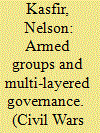

|
|
|
|
|
| Summary/Abstract |
In this special issue we broaden the academic debate on rebel governance by examining additional armed actors – militias, police and foreign intervenors, and the ‘layers’ of governance they add. We develop the notion of ‘multi-layered’ governance to capture the complexity of these cases. We consider ‘mediated stateness’ as a special case of multi-layered governance. We discuss ‘polycentricity’ as an equivalent concept, but deem multi-layered governance more appropriate. The following articles discuss rebels’ legitimation strategies, armed opposition factions, auxiliary armed forces, mediated stateness and intervention by foreign powers to highlight the roles of different actors and the resulting impacts on governance.
|
|
|
|
|
|
|
|
|
|
|
|
|
|
|
|
| 2 |
ID:
157234
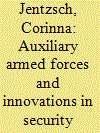

|
|
|
|
|
| Summary/Abstract |
Who rules during the civil war? This article argues that the concept of armed group governance must be expanded to include auxiliary armed forces linked to rebels or the government. Comparing the organization of rebel and government auxiliaries, the article demonstrates that security governance during war is never static, but evolves over time. Evidence from the civil war in Mozambique (1976–1992) shows that the auxiliary’s origin shapes its initial level of autonomy. Second, auxiliary contribution to battlefield success of one side may induce innovations adopted by auxiliaries on the other. Both have distinct consequences for the nature of governance.
|
|
|
|
|
|
|
|
|
|
|
|
|
|
|
|
| 3 |
ID:
157233
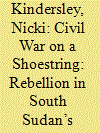

|
|
|
|
|
| Summary/Abstract |
This article is a case study of armed opposition factions in the Central Equatoria region within South Sudan’s current civil war. Based on research in South Sudan and northern Uganda during the spring of 2017, the study focuses on the internal organisation, recruitment and funding processes, and political ideas of these organisations, engaging with recent theories concerning governance and civilians in rebel-controlled territories. It argues that rebels and civilians are not separate analytical categories, and that the region’s new wartime orders are embedded in common local knowledge drawn from historical practice.
|
|
|
|
|
|
|
|
|
|
|
|
|
|
|
|
| 4 |
ID:
157237
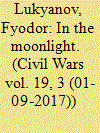

|
|
|
| 5 |
ID:
157235


|
|
|
|
|
| Summary/Abstract |
Since the 1960s, the Palestine Liberation Organization (PLO) has implemented an extensive governance project in Lebanon that is often regarded as contributing to the weakness of the Lebanese state. Challenging such zero-sum logic, this article explores the institutional interdependencies between the PLO and the Lebanese state and their different yet mutual interests in governance coordination. It conceptualises the relations between the PLO and the Lebanese state along a continuum of mediated stateness and thereby contributes to both the operationalisation of the notion of the mediated state and our understanding of the diverse empirical manifestations of the PLO’s governance in Lebanon.
|
|
|
|
|
|
|
|
|
|
|
|
|
|
|
|
| 6 |
ID:
157232
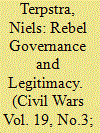

|
|
|
|
|
| Summary/Abstract |
Based on extensive fieldwork in Sri Lanka, we analyze how the Liberation Tigers of Tamil Eelam (LTTE) acquired legitimacy and how legitimation impacts civilian perceptions of the rebels. Despite the LTTE’s reliance on coercion to induce compliance, civilians also supported the LTTE and their imagined state of Tamil Eelam voluntarily. Different LTTE strategies and acts helped creating legitimacy. Effective forms of legitimation were rooted in Tamil nationalism, tradition, charismatic leadership, sacrifices made by LTTE cadres and the people’s need for protection. However, the strong reformative socio-political agenda of the LTTE largely failed to engender legitimacy among the population.
|
|
|
|
|
|
|
|
|
|
|
|
|
|
|
|
| 7 |
ID:
157236


|
|
|
|
|
| Summary/Abstract |
How do militias use the external support provided to them by powerful foreign actors? In Kunduz province, Afghanistan, a wide range of militias have received money, weapons, training and political support through several US-funded militia programmes. While labelled as ‘local self-defence forces’, the observable behaviour of these militias ranges from providing local governance services in the areas they control to preying upon the people they are supposed to guard. Through the analytical lens of multi-layered governance this article investigates how the external support of the United States has been adopted, manipulated, and/or diverted by local militias in Kunduz to serve their own agendas. While the militia support yielded short-term counterinsurgency gains, in the mid to long term, it has unintentionally undermined both the security needs of local populations in Kunduz and US strategic interests.
|
|
|
|
|
|
|
|
|
|
|
|
|
|
|
|